裸机开发与操作系统的区别
裸机开发
- 单一任务(阻塞式)
- 手动分配资源
- 缺乏抽象层
- 灵活性、实时性较高
操作系统
RT-Thread的线程
线程的概念
在RT-thread中,线程是最小的工作单元。每个线程负责一个任务。RT-Thread根据线程的优先级决定哪个任务先完成.。
RT-Thread 支持多达 256 个优先级。0是最高的优先级。
线程的组成部分
- 线程控制块:线程的名字,线程要执行的任务,线程的优先级,线程的状态
- 线程栈:保存临时数据
- 入口函数:线程的任务内容
线程的状态
线程有五种工作状态:
- 初始状态:线程创建还未使用
- 就绪状态:线程准备好,但是没有拿到资源
- 运行状态:线程正在执行任务,占用CPU
- 挂起状态:线程暂时停止工作
- 关闭状态:线程的任务完成了,线程结束,不再使用
线程的优先级
RT-Thread支持256个优先级
时间片
时间片是线程允许工作的时间。如果多个线程的优先级相同,则根据”时间片“,执行完任务A后再执行任务B,轮询进行。
RT-Thread工程
RT-Thread项目创建

RT-Thread工程创建完毕,硬件底层还没有初始化,需要我们自己进行配置
点击CubeMX_Setting进行联调

CubeMX完成RCC、时钟树、串口、工程选项等关键配置后,生成代码,关闭CubeMX
在RT-Thread Studio中生成了CubemxI相关文件
进行编译后,出现一个小bug

这个时候,需要我们将API更换掉
对cubemx文件夹下的main.c进行分析,发现被进行了弱定义

转到RT-thread重定义的main.c
结论:RT-Thread对Hal库进行了硬件层的抽象

RT-Thread初始化默认集成了Shell

创建线程
函数API
1
2
3
4
5
6
| rt_thread_t rt_thread_create(const char *name,
void (*entry)(void *parameter),
void *parameter,
rt_uint32_t stack_size,
rt_uint8_t priority,
rt_uint32_t tick)
|
程序实现
1
2
3
4
5
6
7
8
9
10
11
12
13
14
15
16
17
18
19
20
21
22
23
24
25
26
27
28
29
30
31
32
33
34
| #include <rtthread.h>
static rt_thread_t tid1 = RT_NULL;
static void thread1_entry(void *parameter)
{
int count = 0;
while(1){
rt_kprintf("Thread1 is running, count:%d\n",count);
count++;
rt_thread_delay(1000);
}
}
int main(void)
{
tid1 = rt_thread_create("thread1",
thread1_entry,RT_NULL,
1024,20, 10);
if(tid1 != RT_NULL){
rt_thread_startup(tid1);
}
return 0;
}
|
编译后烧写
实验结果:线程在循环运行

rt_thread_delay()的作用:
rt_thread_delay(1000)即任务以1000ms周期运行
注意:
- 时间片是允许运行的时间
- rt_thread_delay作用是运行的周期,并且是非阻塞的。
多线程创建
1
2
3
4
5
6
7
8
9
10
11
12
13
14
15
16
17
18
19
20
21
22
23
24
25
26
27
28
29
30
31
32
33
34
35
36
37
38
39
40
41
42
43
44
| #include <rtthread.h>
static rt_thread_t tid1 = RT_NULL;
static rt_thread_t tid2 = RT_NULL;
static void thread1_entry(void *parameter)
{
int count = 0;
while(1){
rt_kprintf("Thread1 is running, count:%d\n",count);
count++;
rt_thread_delay(1000);
}
}
static void thread2_entry(void *parameter)
{
int count = 0;
while(1){
rt_kprintf("Thread2 is running, count:%d\n",count);
count++;
rt_thread_delay(1000);
}
}
int main(void)
{
tid1 = rt_thread_create("thread1",
thread1_entry,RT_NULL,
1024,20, 10);
tid2 = rt_thread_create("thread2",
thread2_entry,RT_NULL,
1024,20, 10);
if(tid1 != RT_NULL){rt_thread_startup(tid1);}
if(tid2 != RT_NULL){rt_thread_startup(tid2);}
return 0;
}
|
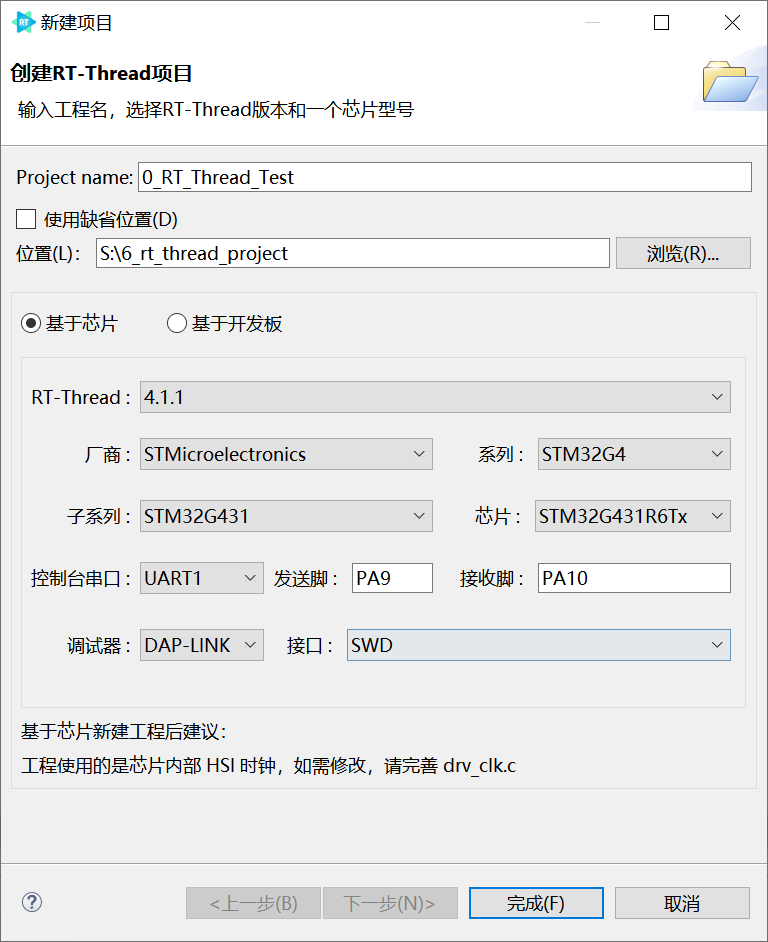
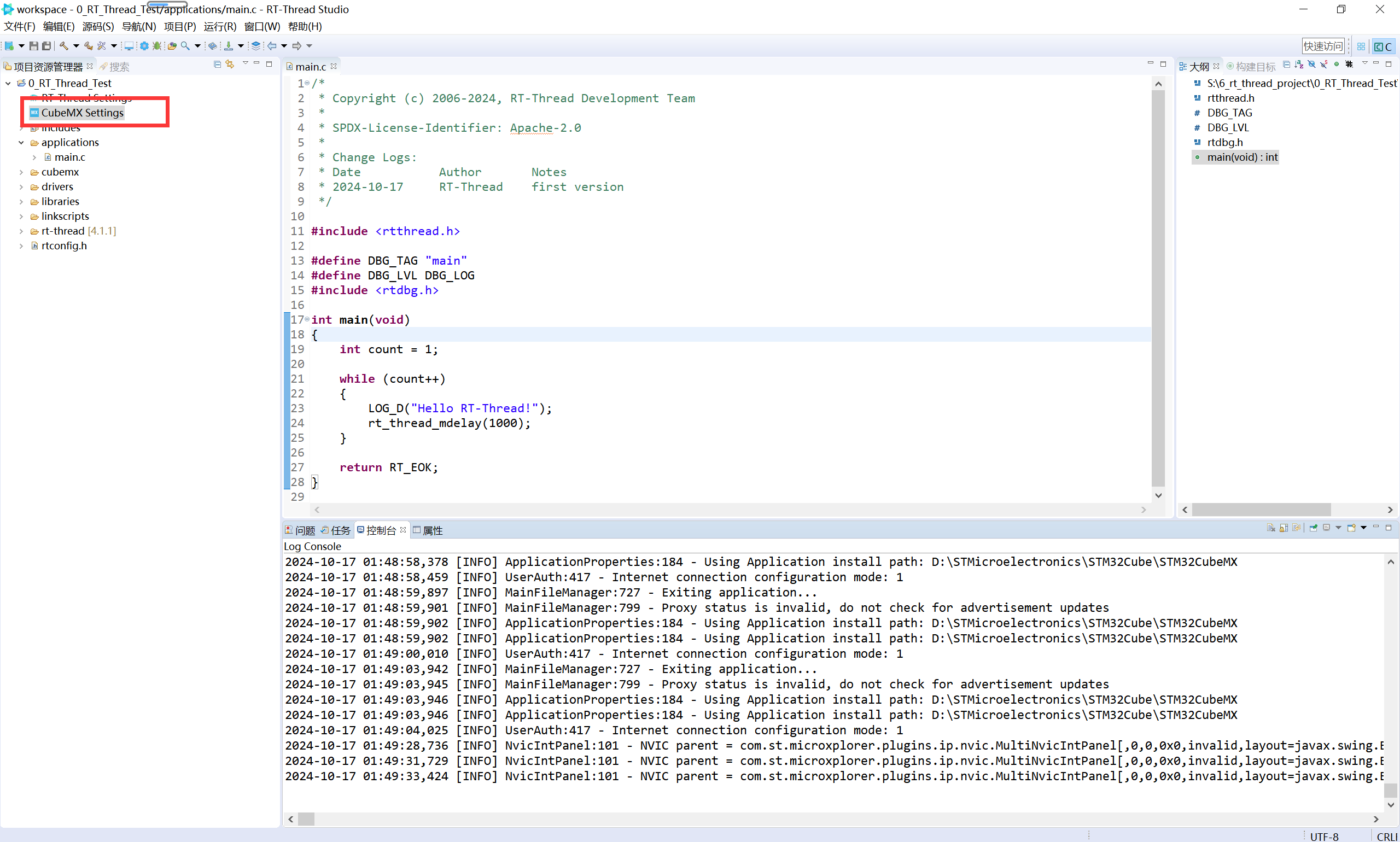

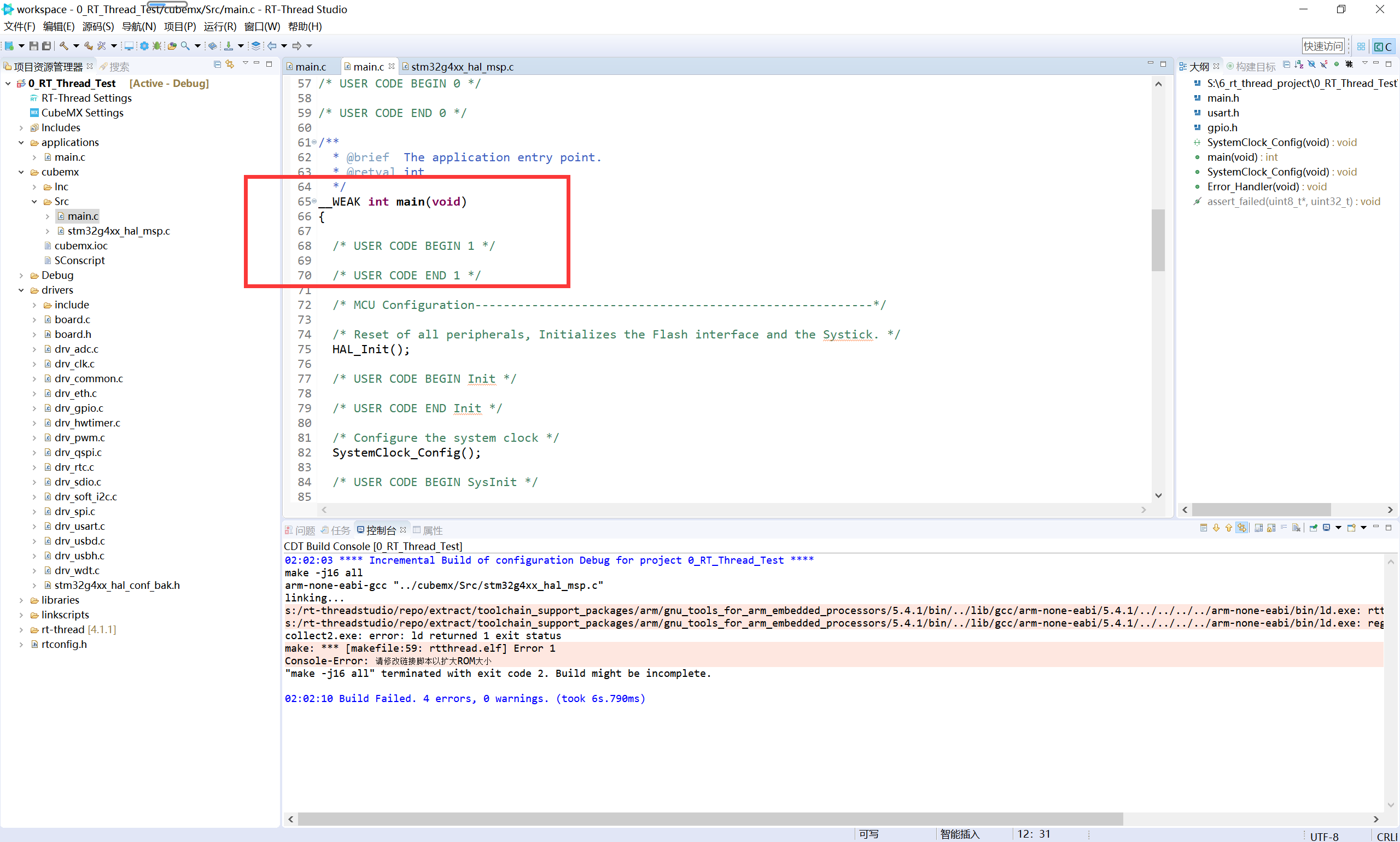

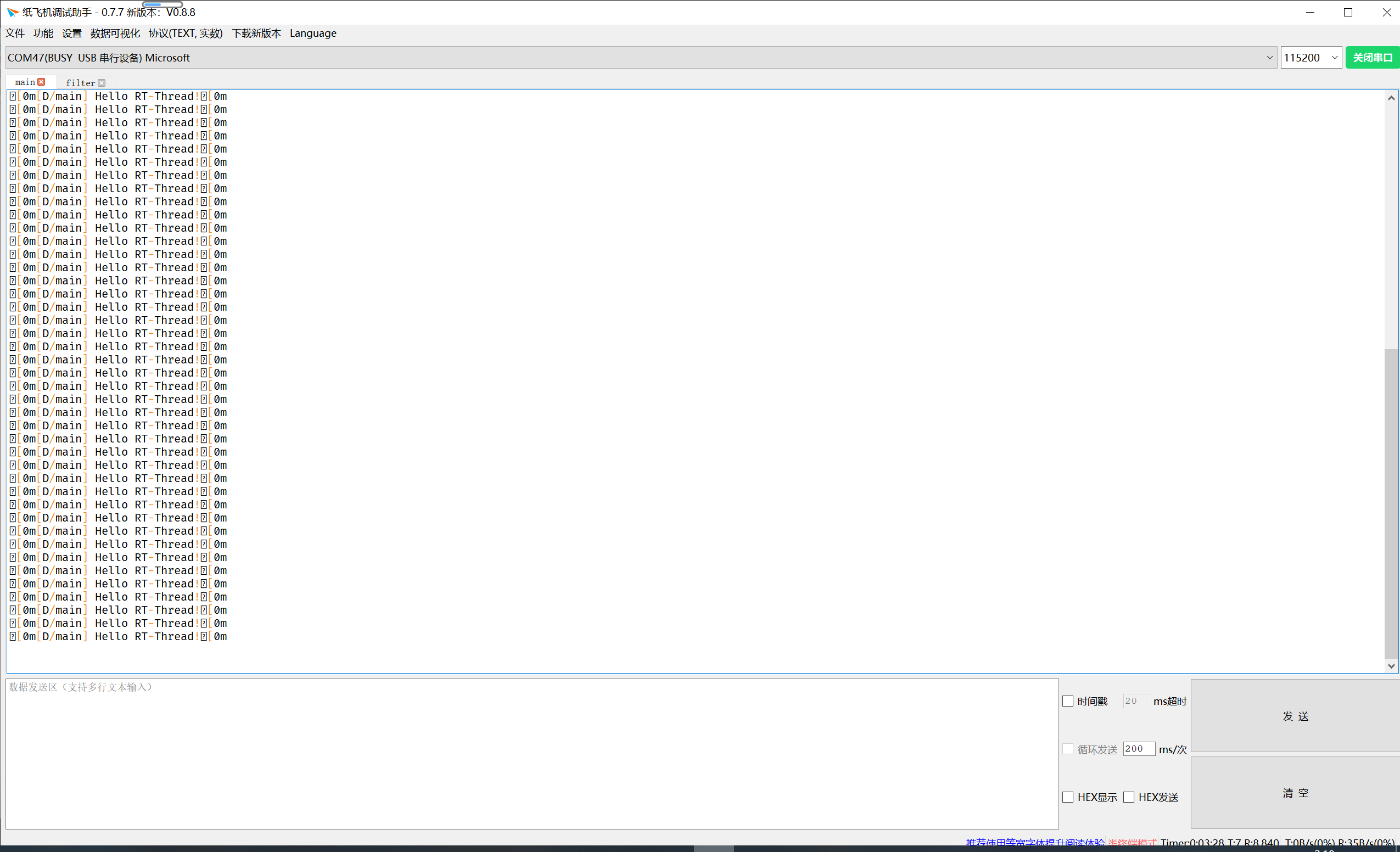
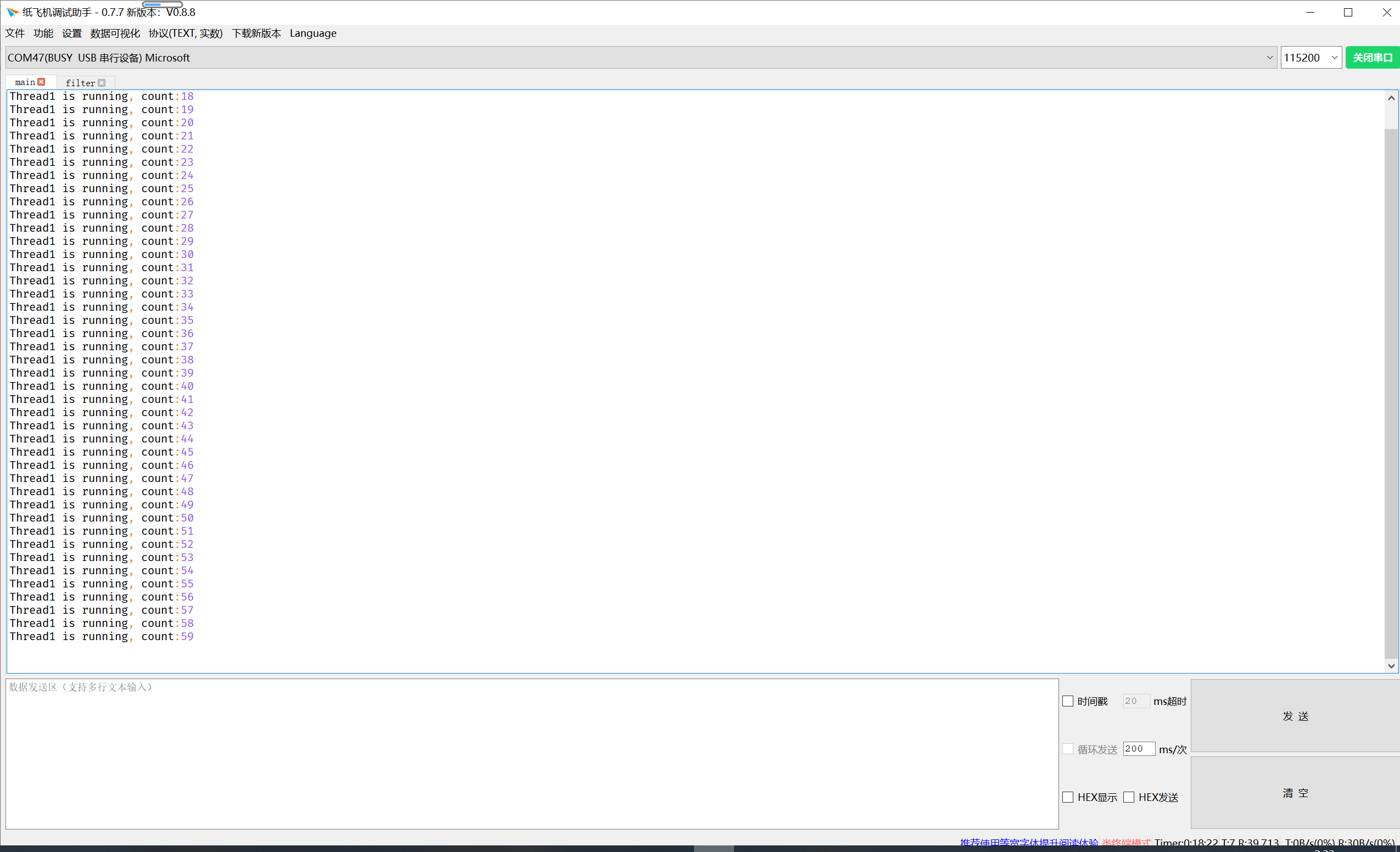

![【stm32单片机】[操作系统][RT-Thread][3]线程通信](/img/blog_cover/rt-thread.jpg)